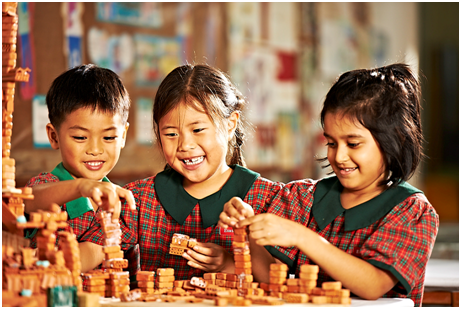Learning Goals
At EtonHouse we believe that curriculum is, in its broadest sense, each and every learning opportunity that a child experiences in a day, both planned and incidental. We also acknowledge the experiences that a child has outside of the school setting and the influence of the specific socio-cultural context in which children develop. We strive to work in partnership with parents towards the establishment of strong home/school partnership to best support children’s learning and development. Our pedagogy reflects current research and ongoing development in the field of early childhood education (John Dewey, Lev Vygotsky, Howard Gardner), we also acknowledge the strong influence of the work of our colleagues in the infant and toddler centers of Reggio Emilia, Northern Italy.
Five domains identify what children learn in the Inquire・Think・Learn Curriculum. This organizational framework defines a structure around which planning and evaluation is developed in order to provide a rich and productive educational experience for our children.
- The Child as a Social/Cultural Being
- Understanding Self and Others
- The Child as Communicator
- Speech and Language including Multiple Literacy’s and Symbols
- The Thinking Child
- Building understanding of the World, Creative and Logical Thinking, Mathematical, Scientific and Technological Understandings
- The Physical Child
- Building Health, Safety and Physical Understandings;
- The Child of the 21st Century
- Building Environmental Understandings
The Hundred Languages of Children
By Loris Malaguzzi, Founder of the Reggio Emilia Approach
| The child is made of one hundred. The child has a hundred languages a hundred hands a hundred thoughts a hundred ways of thinking of playing, of speaking.A hundred. Always a hundred ways of listening of marveling, of loving a hundred joys for singing and understanding a hundred worlds to discover a hundred worlds to invent a hundred worlds to dream. |
The child has a hundred languages (and a hundred hundred hundred more) but they steal ninety-nine. The school and the culture separate the head from the body. They tell the child: to think without hands to do without head to listen and not to speak to understand without joy to love and to marvel only at Easter and at Christmas. They tell the child: to discover the world already there and of the hundred they steal ninety-nine. |
They tell the child: that work and play reality and fantasy science and imagination sky and earth reason and dream are things that do not belong together.And thus they tell the child that the hundred is not there. The child says: No way. The hundred is there. |
 English
English  日本語
日本語 
